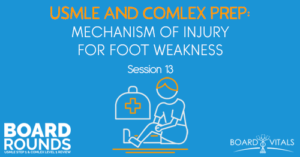Get 20% off a Single 1-on-1 Expert Advising Session Use it for ANYTHING! Learn More!

We have a great musculoskeletal question for today. As always, we’re joined by Dr. Andrea Paul from Board Vitals.
A 27-year-old male is undergoing evaluation for left foot weakness. On his exam, he’s unable to curl his toes. He has one of five strength with plantar foot flexion and five out of five with dorsiflexion. His foot is everted at rest and he has decreased sensation on the sole of his foot.
What was the most likely mechanism of his injury?
(A) Fibular neck fracture
(B) Hip dislocation
(C) L3 disc dislocation
(D) Knee trauma
(E) Pelvic fracture
If you have a fibular neck fracture, this will injure your perennial nerve where you will have lots of dorsiflexion and the sensation on the dorsum of the foot. So choice A is out
L3 is too high up as well. This involves the sciatic nerve. The patient would have felt a neuropathic pain down the back of the leg.
Hip dislocation is unlikely because the patient is a 27-year-old. This is pretty uncommon. But if he did, then that would have affected the gluteal nerve. This would make it difficult for him to stand up or extending his hip.
Pelvic fracture would be more of the femoral nerve, affecting hip flexion and extension.
The knee trauma is the right answer here, If they had said posterior knee trauma, this would have made the exam a little easier. Specifically, this is a tibial nerve injury. It typically runs right down the middle of the back of the popliteal fossa.
So any knee injury is going to affect the nerves and vessels that run through there. When you have an injury in the tibial nerve, the commonplace for pain is the back of the knee. This is a common sports injury, although other things can cause this too. One example is when you’re wearing shoelaces being tied around the calf. Casks can cause this as well as ankle fractures.
It’s asking what’s “most likely” so just keep that in mind. And typically, this is a very common injury known as the tibial tunnel syndrome. It most commonly occurs at the back of the knee. The tibial nerve passes right behind the medial malleus before it goes around the foot so the ankle area would be affected here too.
Check out Board Vitals for some help with your Step 1 or Level 1 exam. They have the 6-month, 3-month, or 1-month access to their QBanks and Practice Tests. Get custom practice test as they simulate real test conditions. Use the promo code BOARDROUNDS to save $50 off your purchase.
Board Vitals (Use the promo code BOARDROUNDS to save $50 off your purchase)

Lorem ipsum dolor sit amet, consectetur adipiscing elit
I just received my admission to XXXXX! This is unreal and almost feels like I am dreaming. I want to thank you for all of your help with my application. I cannot overstate how influential your guidance and insight have been with this result and I am eternally grateful for your support!
IM SO HAPPY!!!! THANK YOU SO MUCH FOR ALL YOUR HELP, IM INDEBTED TO YOU! Truly, thank you so much for all your help. Thank you doesnt do enough.
I want to take a few moments and thank you for all of your very instructive, kind and consistent feedback and support through my applications and it is your wishes, feedback, and most importantly your blessings that have landed me the acceptance!
I got into XXXXX this morning!!!! It still has not hit me that I will be a doctor now!! Thank you for all your help, your words and motivation have brought me to this point.
I wanted to once again express my heartfelt gratitude for your help in providing feedback during my secondary applications. Your guidance has been instrumental in my journey.
Just wanted to share my wonderful news! I received my first medical school acceptance! Thank you for all that you do for us Application Academy!!!
I am excited to tell you that I just got my third interview invite from XXXXX today! I can’t believe it. I didn’t even know if I was good enough to get one, let alone three – by mid-September. Thank you so much for all of your help and support up to this point; I would not be in this position without it!!
I wanted to thank you for helping me prepare for my XXXXX interview. Even in a 30-minute advising session, I learned so much from you. Thank you for believing in me, and here’s to another potential success story from one of your advisees!
I just received an acceptance with XXXXX! This is so exciting and such a huge relief and so nice to have one of our top choice schools! I also received an interview with XXXXX which brings the total up to 20 interviews! Thank so much, none of this would have been possible without you!

Join our newsletter to stay up to date
* By subscribing you agree to with our Privacy Policy and provide consent to receive updates from our company.
Resources
Advising Services
Podcasts & Youtube
Books
About
"*" indicates required fields